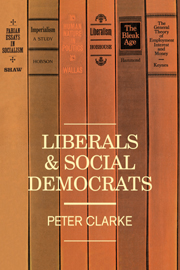Book contents
- Frontmatter
- Contents
- Preface
- System of references
- Prologue: Original sin and the modern state
- 1 The passion for improving mankind
- 2 Good men fallen among Fabians
- 3 Imperialism
- 4 The State and the Nation
- 5 Human nature in politics
- 6 War
- 7 Hobson's choice
- 8 The bleak age
- Epilogue: Sans everything
- Bibliographical notes
- Appendix
- Index
1 - The passion for improving mankind
Published online by Cambridge University Press: 14 January 2010
- Frontmatter
- Contents
- Preface
- System of references
- Prologue: Original sin and the modern state
- 1 The passion for improving mankind
- 2 Good men fallen among Fabians
- 3 Imperialism
- 4 The State and the Nation
- 5 Human nature in politics
- 6 War
- 7 Hobson's choice
- 8 The bleak age
- Epilogue: Sans everything
- Bibliographical notes
- Appendix
- Index
Summary
EARNESTNESS
‘One great reason why clergymen's households are generally unhappy is because the clergyman is so much at home or close about the house’, reflects the hero of Samuel Butler's posthumous novel The Way of All Flesh (1903); and the fact that he was ‘expected to be a kind of human Sunday’ made his children into victims of these occupational tensions (chs. xxiv, xxvi). Graham Wallas claimed few happy memories from his childhood. He was born in 1858, the elder son of a clergyman of the Church of England who, for thirty years, successively occupied two Devon livings: first as Vicar of Barnstaple and then as Rector of Shobrooke, a village two miles outside Crediton and about seven miles north-west of Exeter. Graham had four elder sisters and three younger; and there was one brother, three years his junior, who died in 1887. Graham was miserable at Barnstaple Grammar School before being sent on to public school at Shrewsbury. Shrewsbury was the old school of Samuel Butler whose satirical treatment of conventional Victorian values in his novels was to give these a personal resonance for Wallas.
H. W. Nevinson was a contemporary at Shrewsbury and, though their later relations became somewhat chilled, there was much in common in the early experience of the two boys, both sprung from Evangelical homes. In Nevinson's barbed reminiscence, Wallas ‘always represented his chance thoughts as direct communications from the Holy Ghost’ (H–L Letters, p. 1058).
- Type
- Chapter
- Information
- Liberals and Social Democrats , pp. 9 - 27Publisher: Cambridge University PressPrint publication year: 1978



